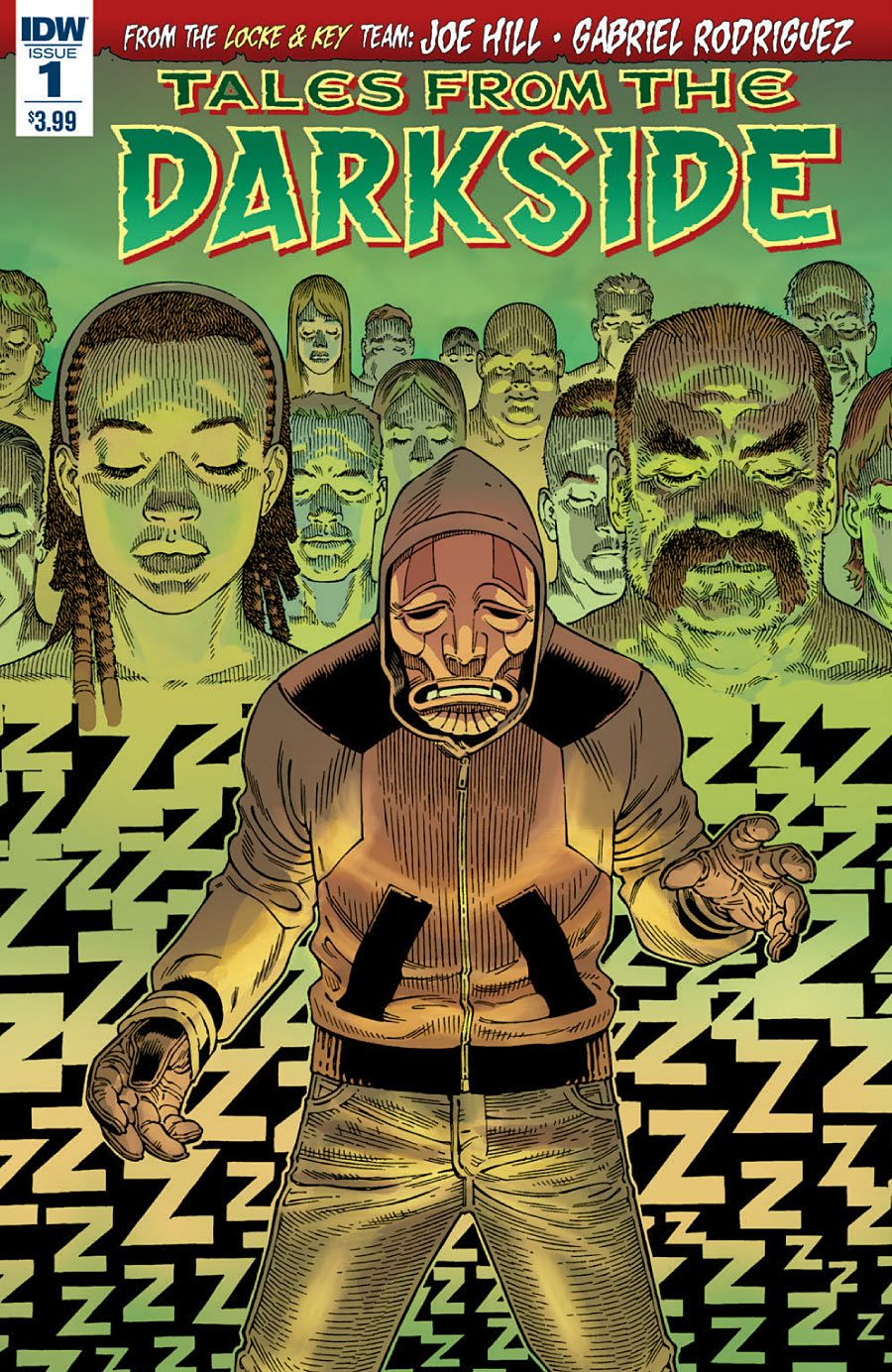Joe Hill and Gabriel Rodriguez's "Tales From the Darkside" #1 kicks off a new horror anthology series with a story titled "Sleepwalker," which revolves around themes of guilt, fate and atonement. Lead character Ziggy may be "sleepwalking" through life, but Hill beats the reader over the head with the symbolism.
The first three pages are heavy on exposition and captions, but the big information dump is digestible because Hill immediately establishes Ziggy's inner voice. Ziggy glosses over his mistakes and he comes across as a careless slacker even in the rhythms of his speech. Rodriguez's clever page and panel compositions also add interest by giving the reader more details than Ziggy's narration reveals. The shape of the gutters mimics water and also reinforces the impression of Ziggy's fluid, aimless day-to-day life, where one day of partying blends into another, with no sleep to divide day from night. Ryan Hill's pale, dank palette reinforces the atmosphere, even in the sunlit scenes.
Hill heavily and openly references Shakespeare's "Richard III," but unfortunately, the "Sleepwalker" is too slight in moral weight and dramatic tension for this kind of borrowed grandeur to earn its usage. Like Richard III, Ziggy is a morally lacking main character, but his crime is one of omission and negligence, instead of the outright journey into deeper evil that Shakespeare depicts in "Richard III." At the most, Ziggy is guilty of involuntary manslaughter, which is far less horrific than Richard's tyranny and conspiracy to commit multiple murders.
Maddy also feels quickly fleshed out as a smart, likable girl. Hill's dialogue for her is strong and distinct from Ziggy's speech and Rodriguez's body language and facial expressions are also evocative, but her romance with Ziggy isn't ever built up, so the two don't have much chemistry and it's difficult to care about the sacrifices the two make for each other in the final scene. The antagonist Mr. Miller is also two-dimensional; his expression of his grief feels too cookie-cutter to make his criminal actions more sympathetic. The tragic ending feels too pat, even though Hill's prose is resonant and poetic. In particular, Ziggy may have fulfilled some kind of eye-for-an-eye justice imposed by the Darkside, but what of the collateral damage to the wholly innocent Maddy? It's annoying when the love interest has to be sacrificed for the hero's moral development.
The supernatural feels tacked on and unnecessary in "Tales From the Darkside" #1. The story loses some traction and believability when a "Darkside event" abruptly occurs mid-way through the issue and an unnamed character comes out of nowhere to assist Ziggy by blabbering out another information dump.
Hill devises Ziggy's punishment like an Ancient Greek curse. Ziggy was sleeping on the job and wasn't looking, so the reversal is that now everyone else who sees him will sleep, but the supernatural element doesn't feel like it flows naturally out of Ziggy's state of guilt. He could have called the girl he loves for help anyway, and the final, inevitable unmasking and cliffside scenes are melodramatic. As a horror story, "Sleepwalker" depends not on gore or the macabre or terror, but on catharsis from cosmic justice, and on this, "Sleepwalker" is only partially successful.
"Tales From the Darkside" #1 has its high points, namely Hill's ability to develop a character's voice quickly and Rodriguez's smooth transitions and pacing, but "Sleepwalker" prioritizes symbolism and concept too much over plotting and characterization.

